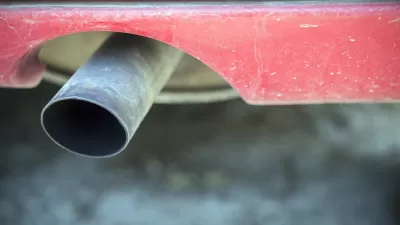Two separate New York Times articles examine cars powered by electricity in Norway and diesel fuel in Britain and Western Europe in the wake of Volkswagen's emissions scandal. A critic of the Norway's e-car subsidies subtly ties the two together.
Paris-based David Jolly goes writes in detail why electric vehicles, or "e-cars" as they are called in Europe, now account for 25 percent of new car sales in Norway.
Though still only 2 percent, the figure is double that of the runner-up, the Netherlands, and is growing faster than anywhere else in the world. More than one-fifth of new car sales in Norway are of electric vehicles.
It comes down to financial incentives, including exemption from expensive bridge and tunnel tolls, and they are working better than predicted.
After more than a decade of government support, official projections had held that there would be 50,000 e-cars on Norway’s roads by the end of 2017. That number, in fact, was reached this past April, and by September had grown to 66,000 all-electric cars, and an additional 8,000 gasoline-electric hybrids like the Toyota Prius.
Reporting from London, Stanley Reed writes that for many owners of diesel cars, emissions is not of great concern. Economy and performance are making it difficult for owners to part from diesel vehicles; owners are concerned that the recall and repair of diesel vehicles could affect performance.
Drawn by diesels’ superior fuel economy over gasoline engines and the lower price of diesel fuel, European consumers have long leaned toward diesel cars — a collective habit that might be difficult to break, despite the new scrutiny the Volkswagen scandal has given to diesel’s dark side.
"Anders Skonhoft, an environmental economist at the Norwegian University of Science and Technology, estimates that the total value of subsidies works out to about $13,500 a year per electric car over each vehicle’s life," writes Jolly. "But for all the money Norway has put into the program, he said in an interview, the country has cut its carbon dioxide emissions by no more than one-tenth of one percent."
If the main goal is clearing up unhealthy pollutants at the local level, Mr. Skonhoft said, it would make more sense to discourage the use of diesel engines. But he noted that Norway, like many other European governments, effectively subsidizes diesel fuel by taxing it at a lower level than regular gasoline. As for greenhouse gases, he said, it would be more effective, and cost far less, simply to impose a carbon tax, discouraging use of traditional cars by requiring drivers to pay more to pollute more.
Indeed, Jolly's London colleague, Reed, goes into the diesel subsidy at greater length. As for the carbon tax, Norway takes that into account—but only when vehicles are purchased, not with fuel purchased, according to Jolly:
Rather than appealing to people’s environmental conscience, [Lars Andreas Lunde, the deputy minister of climate and environment and a Conservative Party politician] said, Norway decided to exempt e-cars from vehicle taxes that are among the highest in the world, including a sales tax of 25 percent plus a registration tax that averages more than $12,000, depending on vehicle weight, engine size, nitrogen oxide pollution level and carbon dioxide emissions.
Finally, an ironic factoid tying diesel-gate and Norway's promotion of e-cars. Care to guess what is Norway's best selling e-car?
It's Volkswagen's e-Golf, which is hopefully no longer available in the diesel version with the 'defeat device' and ‘auxiliary emissions control device’ to enable it to pass emissions tests and then pollute excessively when driven on the road.
FULL STORY: Norway Is a Model for Encouraging Electric Car Sales

Planetizen Federal Action Tracker
A weekly monitor of how Trump’s orders and actions are impacting planners and planning in America.

Restaurant Patios Were a Pandemic Win — Why Were They so Hard to Keep?
Social distancing requirements and changes in travel patterns prompted cities to pilot new uses for street and sidewalk space. Then it got complicated.

Map: Where Senate Republicans Want to Sell Your Public Lands
For public land advocates, the Senate Republicans’ proposal to sell millions of acres of public land in the West is “the biggest fight of their careers.”

Maui's Vacation Rental Debate Turns Ugly
Verbal attacks, misinformation campaigns and fistfights plague a high-stakes debate to convert thousands of vacation rentals into long-term housing.

San Francisco Suspends Traffic Calming Amidst Record Deaths
Citing “a challenging fiscal landscape,” the city will cease the program on the heels of 42 traffic deaths, including 24 pedestrians.

California Homeless Arrests, Citations Spike After Ruling
An investigation reveals that anti-homeless actions increased up to 500% after Grants Pass v. Johnson — even in cities claiming no policy change.
Urban Design for Planners 1: Software Tools
This six-course series explores essential urban design concepts using open source software and equips planners with the tools they need to participate fully in the urban design process.
Planning for Universal Design
Learn the tools for implementing Universal Design in planning regulations.
Heyer Gruel & Associates PA
JM Goldson LLC
Custer County Colorado
City of Camden Redevelopment Agency
City of Astoria
Transportation Research & Education Center (TREC) at Portland State University
Camden Redevelopment Agency
City of Claremont
Municipality of Princeton (NJ)



























